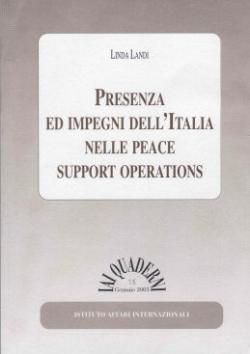Presenza ed impegni dell'Italia nelle Peace Support Operations
After the end of bipolar condominium that freed wide geopolitical spaces, Italy's foreign policy has been characterised by a marked activity on the international scene through the use of its military apparatus, though with little long-sightedness in planning its own commitments. To avoid the exclusion of Italy from the creation of directive-making bodies, and therefore emarginated even from the choices that involve its own key interests, it is necessary to define a long-term foreign and security policy that is organised and coherent, through which Italy can become a credible provider of security, both in terms of military structures as well as in those created out of the co-operation for development. After briefly illustrating the political-strategic and military-tactic problems which have caused the repeated failures of the UN peace-keeping operations, accelerating the re-nationalisation of defence policies, this study attempts to outline a general panorama of the problems that have arisen from the participation of Italian contingencies in multinational operations. Moreover, this work attempts to verify the congruity of Italy's response (in real terms) to the requests created by the new international context. In particular, this work has analysed the constitutional and legislative presuppositions that legitimated the dispatch of Italian Armed Forces abroad, highlighting a situation that sees the planning of defence and security policies up against an unsatisfactory constitutional prevision of crises, and without a general law which can be applied to the new typology of conflicts. Moreover, following a close examination and a diachronic comparison of the most important missions carried out by the Italian Armed Forces, the capacity of Italy to qualify itself as a serious and reliable partner in the multilateral context is postulated, prior to a requalification of the military apparatus, for a stable foreign policy that is bipartisan, which can assure long-term coherence for national initiatives and for a political desire coherent with national interests.
-
Details
Roma, Istituto Affari Internazionali, January 2003, 83 p. -
In:
-
Issue
16
Introduzione
1. Aspetti generali delle operazioni a supporto della pace
1.1 Le operazioni di mantenimento della pace: evoluzione storica e terminologica
1.2 I problemi attuali delle operazioni delle Nazioni Unite: mancanza di una preventiva copertura finanziaria e problemi operativi
1.3 Problemi di gestione politica
2. L'ordinamento italiano e l'uso della forza armata
2.1 Peace Support Operations secondo l'ordinamento costituzionale italiano
2.2 Il sistema decisionale
2.3 Il ricorso alle Forze Armate nella legislazione ordinaria
2.4 Il finanziamento delle operazioni fuori area
3. Il contributo dell'Italia al mantenimento della pace e della stabilità
3.1 La partecipazione italiana alle missioni internazionali: cenni storici
3.2 Le missioni italiane del dopo Guerra fredda
3.3 Gli interventi in Somalia e Mozambico
4. Crisi balcanica: il coinvolgimento dell'Italia
4.1 L'approccio italiano alla disgregazione jugoslava
4.1.1 Le operazioni navali di enforcement dell'embargo militare e i bombardamenti aerei
4.1.2 Da Ifor a Sfor
4.2 Il conflitto del Kosovo
4.3 Gli ultimi impegni
5. Conclusioni: l'Italia da consumatore a produttore di sicurezza?
Tabelle



